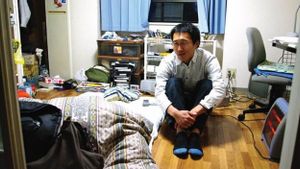YOGYAKARTA The term hikikomori comes from Japan which is a combination of the hiki word means attractive and the komori means in'. The term refers to people who withdraw from society'. Hikikomori is a cultural syndrome that not only occurs in Japan, but spreads throughout the world and affects the increasing level of loneliness.
Menurut penelitian tahun 2023 diterbitkan dalam Clinical Child and Family Psychological Review, hikikomori adalah bentuk penarikan diri dari kontas yang ekstrem dan dipengaruhi berbagai faktor. Faktor yang mempengaruhi seseorang mengalami syndrome hikikomori, termasuk diantaranya karena kondisi krinsy, bersypribadikan maladaptif, dynamics keluarga termasuk polaku yang merugikan, pengalajahan yang negatif, pengalahaman masyarakat, dan penggunaan media digital dengan internet secara berlebihan.
A person with a hierarchy, characterized by a persistent refusal to leave the house for more than six months, an inconsistency in most activities, dropping out of school, stop working to stay at home, and a dependence on family without a plan to live independently. In Japan, in 2022 there are about 1.46 million pertapa' in the age group between 15 and 64 years. Launching Psychology Today, Wednesday, May 1, a 2019 survey showed a total of 613,000 people in Japan aged between 40-64 years including in the adult hikicomory' category.
Citing the psychological explanation of Markploy, Ph.D., last year the Minister of Equality Gender and Family in South Korea, launched a program offering to provide a monthly allowance of $490 to hikikomori youth to return to school, find work, and society.
The syndrome, which does not only occur in Japan, also occurs in the United States, China, India, Brazil, and other European countries. So, what causes a person to "choose a hikicomori"? According to a 2019 study published in the Frotiers of Psychology, the hikikomori is associated with someone's interpersonal relationship. Other studies suggest that hikikomori is due to the following:
Participants in research by hikikomori reported that they felt incompetent in a world full of challenges. Many of them feel traumatized from past experiences and are overshadowed by doubts in facing real-world challenges in the future.
Another reason people withdraw from society is because of negative experiences with other people who arise at school, workplace, or at home. Some research participants stated that loneliness is not too painful for them compared to dealing with other people.
One of the research participants said, 'I am a weak person. I can only hide in the dark'. This shows that a hikicomori has no alternative in adapting. It seems, which causes them to be burdened by low self-esteem and low confidence in interacting with real life. They are also afraid of judgment so that it contributes to withdrawals. They also feel failed and afraid to disappoint others.
The three causes of the hikicomor above are not unresurable. But it's important to remember, not all hikicomori resistance to clinical treatment. In fact, many people are seeking help but may not be sure how to access it or question their ability to do so.
SEE ALSO:
Research also shows that many hikicomori people live with their families. This shows the healing process can start from home. So that the hikicomori can interact with the world again, in the following way:
Through looking at how many hikicomors have experienced, we can underline the importance of social support networks and prioritize mental health awareness around the world. It is also important to create an environment where a person feels valued, supported, and empowered.
The English, Chinese, Japanese, Arabic, and French versions are automatically generated by the AI. So there may still be inaccuracies in translating, please always see Indonesian as our main language. (system supported by DigitalSiber.id)


















